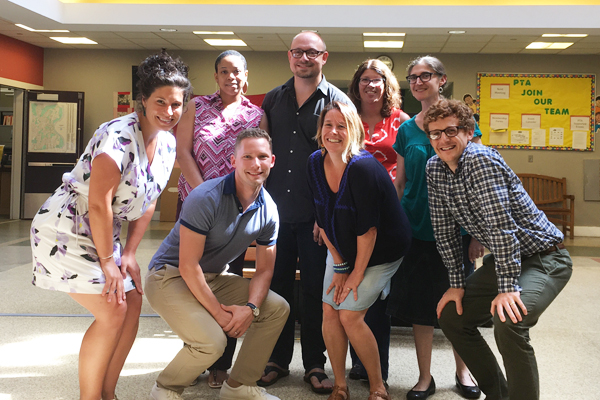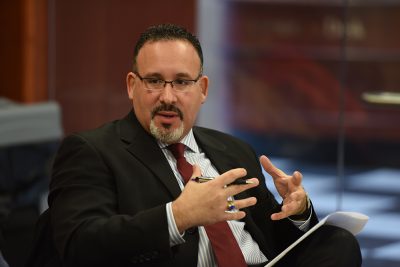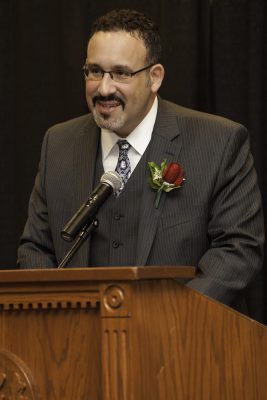Neag School of Education (EDLR’s partnership with Queen Rania Teacher Academy (QRTA) has finished its second year of the three-year partnership)
UCAPP
UCAPP Alumna Claims Assistant Principal Position
The New Haven Register shares Seymour’s Chatfield-LoPresti School gets new assistant principal (UCAPP alumna, Kathleen Freimuth)
UConn Remembers Neag School Alum Robert Dunn ’51, ’55
UCAPP scholarships supported by late alum in Neag’s feature story.
UCAPP’s Summer PLUS Students

This past summer Dr. Sarah Woulfin taught the Educational Policy course to the PLUS Hartford cohort. Students analyzed multiple current policy issues, including educator evaluation, state assessment policies, school discipline, and the CCJEF decision. Dr. Carbone, a Hartford Public Schools superintendent and Neag Ed.D. graduate, was a guest speaker on principals’ roles in enacting district initiatives.
Scott Hurwitz Named Principal of Brien McMahon High School
Norwalk Public Schools (UCAPP alum selected as school’s new principal)
UCAPP Alum, Dias Appointed As Assistant Principal
John Wallace Middle School announces UCAPP alum, Dan Dias, as the new Assistant Principal on the Newington Public Schools website.
Five Questions with Dr. Dale Bernardoni, UCAPP Clinical Supervisor
Within an hour of her retirement back in 2010, the University of Connecticut Administrator Preparation Program offered distinguished principal Dale Bernardoni, Ed.D., a position as a clinical supervisor. Dr. Bernardoni has been with the UCAPP Program ever since, working alongside other outstanding faculty to prepare the next generation of school leaders in Connecticut. Earlier this semester, we spoke with Dr. Bernardoni about her career as an educational leader.
1. How did you start your career in education?
Like so many others who are teachers, my mother was a second-grade teacher. From a very early age, I knew that I loved children and that I thought teaching was a very special profession. I knew I would, in some way, shape or form, be involved in education. Interestingly my first teaching role, because I was an avid ballet dancer and later a performer, was teaching ballet for several years when I was in high school. I loved that so much that I went onto college with a double major in education and dance, not knowing which direction I was going to go in. I went in the dance direction for a little while, and then came back and finished my undergraduate degree.
2. What led you towards educational leadership?
I had been a teacher for 16 years, and during that time, I organized a student newspaper, facilitated a student council, and taught classes after school just for the fun of it. From early on I was told,
“You ought to be a principal, you ought to be a teacher leader.” After my third year of teaching, I was selected to design and implement a program for gifted and talented in Cheshire, which was where I was teaching at the time.
From that point on, I was given opportunities to present professional development, both within the district and on the state level. It was at that time, even before I became a principal, that I became aware of the Connecticut Association of Schools, and became involved with a variety of things through the CAS workshops. It was a very seamless transition for me, and I’m one of the few people who went directly from being a classroom teacher to being a principal.
3. You were the founding principal at Wintergreen K-8 Interdistrict Magnet School in Hamden, CT. What was that experience like?
It was one of the schools in the late ’90s that was started in response to Sheff vs. O’Neill. Approximately 30 interdistrict magnet schools were opened in the state at that time. As one of the few magnet schools in the New Haven area, it serviced the towns of Hamden, New Haven, Wallingford, Woodbridge, [and] now also includes students from Meriden as well as choice students. Wintergreen Interdistrict Magnet School was unique in that it was the only school in Connecticut developed in partnership with Edison Schools and the only Interdistrict Edison school in the country. I often described the school design, curriculum, and professional development structure as being intelligent and elegant. I got to hire the entire staff, which was such a unique opportunity. A lot of people were very interested in what we were doing and how we were doing it. It was very exciting to be part of that.
4. Today controversy surrounds school choice, vouchers, magnet schools, and charter schools. Where do you see Connecticut heading with its choice programs?
Providing a variety of school designs strengthens educational opportunities. Theme focused magnet schools, for example, enable families to match their child’s skills, talents and needs with schools that offer specialized programming. However, I personally question the belief that offering vouchers will improve education overall. It has the potential to take badly needed funding from schools that serve students with the greatest challenges therefore broadening the gap between privileged and less privileged students.
5. Your final principalship was at McKinley Elementary School in Fairfield, a school with a very diverse school community. School leaders sometimes struggle to create home and community partnerships. How were you able to successfully build partnerships with your parents and community?
I was invited to go to McKinley specifically because that’s a school, unlike one might picture in one’s mind about Fairfield schools; filled with immigrant children. There was a year when there were 42 different languages spoken by McKinley families. It was an honor to work with such a beautiful community with a real sense of global respect and appreciation for each other. It’s a model of what schools can become [and] for how people who have come together from all over the world can live together and appreciate each other’s cultures and languages. There was a highly functional PTA, not just raising funds and doing fun things with kids and their families, but actively supporting numerous cultural activities. We also were able to take advantage of a lot of community resources, which is part of what my work there was about. I did presentations at General Electric to help them understand that, at least in this one section of Fairfield, there were a lot of people from various other countries. Many of the parents of the students had been professionals where they came from and they left because it was no longer safe to live there. I also worked with the United Way, [who] designated McKinley as a School of Hope. They provided resources for us. We started a Title 1 funded preschool for children whose families spoke another language at home, and we added text materials that supported the work with early literacy. We also partnered with the Boys and Girls Club of Coastal Fairfield County, who provided high school students who tutored some of our students after school four days a week. Because there were so many high school kids that came into work with so many of our identified students who needed just an extra boost, they hired a coordinator who oversaw that program for our school. Between our three biggest community donors and grants that we received, we were able to really create a very comprehensive and energized school.
Dr. Richard Gonzales, UConn Director of Educational Leadership Preparation Programs, appreciates the guidance and wisdom Dr. Bernardoni shares with aspiring school leaders.
“Our participants continue to benefit from accomplished educators like Dale Bernardoni who’ve dedicated their careers to improving teaching and learning across our state.”
As for Dr. Bernardoni, she will continue to help the program evolve to meet the needs of UCAPPers in an ever-changing education landscape.“I love it,” she beams.
“I tell everyone it’s absolutely the best administrator preparation program in the state of Connecticut. I’m unabashedly biased in that regard. I’m honored to be a part of it.”
10 Questions With Educational Leader and Alum Miguel A. Cardona
How a Principal-Training Model in Jordan Is Transforming Instruction
Education Week, UCAPP’s principal-training program in Jordan is featured
Grace Nathman Earns Top Principal Award
New Haven Public Schools announces Principal of the Year Award, UCAPP Alumna Grace Nathman.

